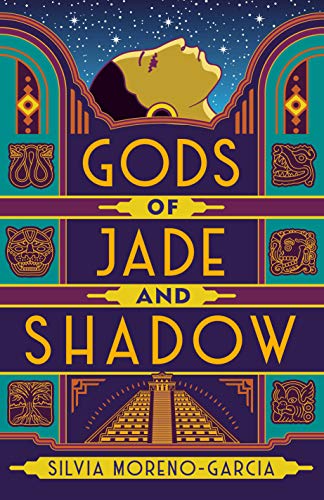Ever since her father’s death, years ago, Casiopea Tun has been a poor relation to her mother’s wealthy family. She’s stuck doing drudge work for any member of the family who wants something from her — particularly her cousin Martin, who resents that she will never stop insisting on her personhood, no matter how much he tries to make her submit. (Not in a sexual way! I mention this because I kept worrying that there was going to be a sexual element to this relationship, but there’s not. So don’t worry.) Her wants are small, but completely out of reach: She wants to drive a car; she wants to dance a fast dance with a boy.

One day, at the absolute end of her rope, Casiopea opens up a locked chest in her grandfather’s bedroom, and out comes the spirit of Han-Kame, the Mayan god of death. He needs to regain his throne from his usurping twin brother Vucub-Kame, and he needs Casiopea’s help. As they travel around Mexico searching for the missing pieces of Han-Kame, Casiopea’s life force is gradually drained, while Han-Kame gradually becomes more and more human and less and less god.
Gods of Jade and Shadow draws from the Popul Vuh, but I can report from my own experience that you don’t need to be familiar with it to enjoy the story. At its heart, it’s a road trip story and McGuffin hunt of the highest order, and a story about stories without getting too terribly precious about it. I loved following Casiopea and Han-Kame around Mexico on trains and in fast cars, as each of them learns about being a human in a wide and varied world. Han-Kame, of course, has always been a god, and Casiopea has always been a drudge, with a life that offered her very little scope for self-discovery. It’s brilliant to witness her world opening up.
Casiopea overall is just a terrific character. One of my favorite things about this book is that although it’s a fantasy novel, and although it’s set in The Past (Jazz Age!), Casiopea is never under sexual threat. Her physical safety grants her the space to be her own person, a stubborn and intelligent woman who looks up at the stars and dreams of freedom. Most particularly, she refuses to be cast in the role of a drudge — she may have to act the part, but she’ll never internalize it, and this is what drives her cousin Martin wild. Though she agrees to help Han-Kame (she doesn’t have much choice, since he’s draining her life force as long as he’s not a full god), there’s little she wants in return — just her freedom.
Meanwhile back at the ranch, Martin is called upon by Han-Kame’s twin brother to stop Han-Kame and Casiopea from realizing their goal. As they travel across the country in search of the missing pieces of Han-Kame’s body (his eye, his ear, a necklace, and his index finger) that will make him fully a god, Martin is trained and aided by Vucub-Kame to stop them. He’s a whiny sack of shit who’s been shitty to Casiopea since she came into his home, but he’s been promised great rewards if he succeeds, and utter doom if he should fail. So like, he’s motivated. And Casiopea and Han-Kame, though they are growing closer as Han-Kame becomes more of a man and less of a god, weaken each day their spirits are linked.
Much as I love a road trip (I really, really love a road trip), Gods of Jade and Shadow wouldn’t have worked without Moreno-Garcia’s brilliant evocation of Jazz Age Mexico. Everywhere Casiopea goes, she sees new things: flappers with bobbed hair, high-ceilinged hotels with room service, and flower shops with witches inside. Despite being on record as hating places (down with places!), I was all about this setting. It’s particularly good viewed through Casiopea’s eyes because — I don’t know how to say this exactly! — her wants are so modest. She wants soft sheets and a comfortable bed; she wants to see the world and be larger than herself. For her it’s not a question of gold and jewels, but a question of expansiveness: her adventure with Han-Kame is dangerous, yes, but it offers her a chance to live in the world, instead of being hidden away from it forever.
All in all, a gorgeous historical fantasy about gods, death, mercy, and freedom. Highly recommended.